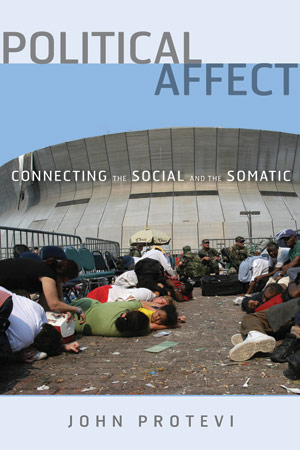
In Political Affect I address human nature as bio-cultural. Each one of us is a “body politic” that connects the social and the somatic. I avoid the extremes of social constructivism and genetic determinism by claiming we inherit a minimal human nature that gets fine-tuned by culture. In a formula, our human nature has evolved to be so open to our nurture that it becomes second nature.
I get to my notion of human nature as “body politic” by putting the “embodied mind” school of cognitive science together with the post-structuralist French philosopher Gilles Deleuze. What attracted me to the embodied mind school (e.g., Hubert Dreyfus, Evan Thompson, Alva Noë, and the late Francisco Varela) is the critique of the standard computer metaphor of cognition as information processing and its alternate vision of cognition as an organism directing itself in its environment. Such embodied cognition is inescapably affective; the old division of reason and emotion needs to be rethought as “affective cognition.”
What Deleuze brings to the table is a wide-ranging materialist ontology, so that we can use the same basic concepts of self-organizing systems in both natural and social registers. This enables me to couple the “politic” to the “body,” to connect the social and the somatic. Basically, Deleuze lets us go “above” and “below” the subject; “above” to politics, and “below” to biology. We live at the crossroads: singular subjects arise from a “crystallization” or “resolution” of a distributed network of natural processes and social practices.
Political Affect starts by laying out the theory of politically inflected affective cognition, bringing Deleuze together with dynamical systems theory (a.k.a. “complexity theory,” or the theory of self-organizing material systems), and a number of positions in the affective, cognitive, and biological sciences, including “developmental systems theory,” a biological perspective that emphasizes epigenetic (cellular, organic, and even extra-somatic) factors as well as genetic factors in inheritance and development.
I then compare Aristotle, Kant, and Deleuze on the interchange of theology, biology and politics that has always haunted the philosophical treatment of the organism. Finally, I provide three case studies where the social-somatic connection that constitutes human nature results in the bypassing or at least the attenuation of consciousness. That is, I investigate instances where biologically inherited basic emotions, which have received in cultural experience different triggers and thresholds, result in, if not outright “takeovers” of behavior, at least strong unconscious biases. The three case studies are the Terri Schiavo case (empathy), the Columbine High School massacre (rage), and Hurricane Katrina (fear).
“Continental philosophy of science looks at scientific practice as its object of study; it doesn’t incorporate scientific findings in a continental investigation of philosophical problems.”
What I wanted to do in Political Affect was write a book on advances in the sciences that would use a continental figure (Deleuze) as part of its theoretical basis, and yet still be readable by both analytic and continental philosophers. This was something of a challenge, because for much too long philosophers have tolerated a harmful division in our profession, the infamous divide between “continental” and “analytic” philosophers. It’s impossible to avoid clichés in discussing this divide, for it was instituted and lives on via the power of cliché, unexamined presupposition, mutual distrust, and ignorance. So, the cliché is that the continentals study and model their inquiries after art and literature, while the analytics study and model their inquiries after the sciences.
Of course there are exceptions—analytic aesthetics and continental philosophy of science are subdisciplines on either side—but there is a sad kernel of truth in the cliché. The problem for my project is that continental philosophy of science looks at scientific practice as its object of study; it doesn’t incorporate scientific findings in a continental investigation of philosophical problems—in my case, the concept of human nature.
The opening to this project—a continental philosophy not “of” science, but “with” science—was provided by the way in which the embodied-mind scholars use the classical phenomenologists—Husserl, Heidegger, and Merleau-Ponty—as their philosophical resources in their reading of the cognitive sciences. Insofar as these phenomenologists are an important part of the training of any continental philosopher, there was the chance here to get continental philosophers to read cognitive science by following the trail of the embodied-mind thinkers and their use of phenomenology.
On the other hand, I wanted to nudge the embodied-mind school along one more step in their reading of continental philosophy, from the phenomenologists to the post-structuralists—in this case, Deleuze. While the turn to an embodied subject by means of phenomenology is a great advance over the computer model, we need to pay attention to the feminist (Simone de Beauvoir) and anti-colonialist (Frantz Fanon) criticism that the embodied subject of the phenomenologists had abstracted from racialized and gendered subjectivity. But such abstraction only serves to hide an implicit masculine and empowered subject benefiting from its social position, as Iris Marion Young shows in her essay “Throwing Like a Girl.” So instead of “the” (abstract) embodied subject, I propose Deleuze’s emphasis on interwoven natural and social systems to think about how multiple subjectification practices produce a distribution of affective cognitive traits in a population of subjects.
The recent earthquake in Haiti echoed—on a much larger scale—the events of Hurricane Katrina, provoking a depressingly familiar reaction from the authorities responsible for militarizing or “securitizing” relief efforts.
In Chapter 7 of Political Affect, I look at how a racialized fear contributed to the delay in government rescue efforts in Hurricane Katrina until sufficient military force could confront thousands of black people in New Orleans; the government’s racialized fear flew in the face of the massive empathy of ordinary citizens, a communal solidarity that lead them to rescue their friends, neighbors, and simple strangers until they were forced to stop by government order.
The Katrina chapter has the widest angle of approach of the three case studies. Deleuze’s ontology of self-organizing material systems not only uses the same concepts to think about natural and social systems, it thereby shows how they can interact. I begin the chapter with a study of the “elemental” factors of the hurricane event. I first examine the land and the river to examine the precarious state of Louisiana’s coast. Flood-proofing the Mississippi river has starved the bayous of their annual dose of rich alluvial sediments, while navigation channels for oil company boats have introduced salt water far into the wetlands, upsetting the balance required for their growth and maintenance.
I then look at the sun, the wind, and the sea in the formation of hurricanes as meteorological systems. These natural factors of the earth’s thermal regulation system are also key factors in Louisiana’s history: the trade winds and Gulf Stream enabled the Atlantic triangular trade system, while sugar (a bio-usable form of solar energy) was a key crop in both Saint Domingue/Haiti and Louisiana.
Next, I examine the role a racialized fear of a black slave uprising has played in Louisiana history, especially the Pointe Coupee conspiracy trial of 1795. At the height of both the Haitian and French Revolutions, a group of black slaves and poor whites conspired to rebel against the white power structure. The conspiracy unraveled, but only the blacks were put on trial, effectively turning a Jacobin political revolt into a racialized revenge fantasy.
The book then briefly reviews recent affective neuroscience evidence of increased amygdala action in racial perception; I speculate as to the racial undertones of the decision to stop the spontaneous rescue effort. In particular, I look at the rumors of shots at rescue helicopters and the subsequent echo of the “Black Hawk Down” episode in Somalia, as well as the rumors of black men sexually assaulting “tourists” (a code word for “whites”).
The political philosophy framework of the chapter comes out as I juxtapose the way in which pundits indulged a rhetoric of Hobbesian fantasy, when the reality was much more Rousseauean. In New Orleans, there was very little, if any, atomized anti-social predation; there was instead massive and spontaneous solidarity born out of empathy for threatened lives. If Hobbes was present at all in New Orleans, he was there beforehand in the atomizing practices of neoliberal capitalism, and afterward in the neoconservative militarization of rescue efforts. During the storm and the days of solidarity following it, he was absent.
“During the Katrina storm and the days following it, pundits indulged a rhetoric of Hobbesian fantasy. The reality was much more Rousseauean. There was very little, if any, atomized anti-social predation in New Orleans; there was instead massive and spontaneous solidarity born out of empathy for threatened lives.”
I hope that Political Affect will benefit both political philosophy and cognitive science by placing affective cognition in a political context. Cognitive science benefits by appreciating negative affects as well as the positive cognitive aspects of culture. It is true, as Andy Clark in particular has shown, that cultural forms and technological products can be “props” and “scaffolds” for our thinking. But not all cultural forms empower subjects. Depending on your developmental path, cultural practices can disempower you emotionally, just as they deny you access to heuristic resources. On the other hand, political philosophy benefits by stepping back from a focus on the rational subject and understanding how we sometimes respond to social triggers with decisions mediated by fear, anger, anxiety, and sadness; or even, at other times, with blind panic and rage.
Not all affects are negative, however, so we need to rethink human nature in terms of our capacity for love and empathy (what Aristotle would call philia). Theories of human nature are a political battleground, and we cannot be intimidated by the cheap cynicism and blustering scientism of the Right. For too long, the Left has adopted social constructivism to fight racist and sexist constructions of human nature. But in the meantime the neoliberal Right has distanced itself from old-fashioned racism and sexism to put forth a version of human nature as the individualist, competitive, utility-maximizing rational agent, an agent they claim is the result of natural selection in ultra-Darwinian competition.
But the neoliberals’ monopoly on biological discourse is overthrown by new research. We have to have the courage to claim that current evolutionary biology and developmental psychology show that human nature is prosocial in its default setting.
Similarly, in their overreaching claim to be the inheritors of the classical liberals, neoliberals open the door to rehabilitating the theory of moral sentiments proposed by Adam Smith and David Hume. The political challenge of the new view of human nature is to extend the reach of prosocial impulses beyond the in-group, protect them from the negative emotions, and build on them to genuine altruism.
All this is not to deny the selfish nature of the basic emotions of rage and fear. The key to a fruitful Left approach to human nature is the study of how such selfish, negative emotions are manipulated, or, more positively, how a social order can be constructed to minimize them and to maximize positive affects. I hope Political Affect can contribute to that project.


John Protevi is Professor of French Studies at Louisiana State University. He received his PhD in Philosophy from Loyola Chicago in 1990. Among other works, he is the author of Political Physics: Deleuze, Derrida, and the Body Politic (Athlone / Continuum, 2001), and editor of A Dictionary of Continental Philosophy (Yale, 2006). He maintains an extensive website of course materials and current research papers.